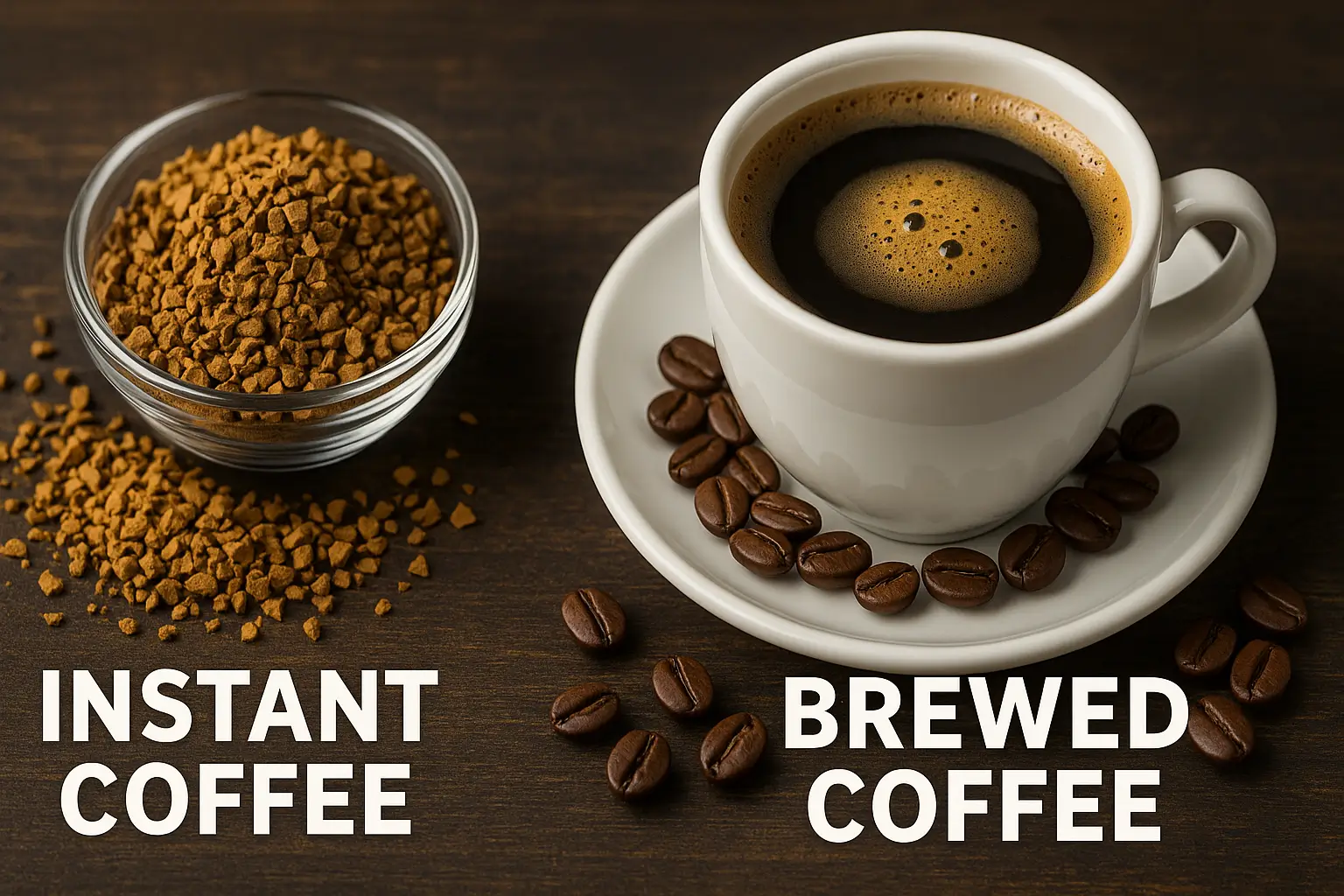Whether you’re rushing out the door or enjoying a slow morning, coffee plays a central role in many people’s routines. But not all coffee is created equal. One of the most common comparisons is between instant coffee and brewed coffee. While they both provide that much-needed caffeine kick, the differences go far beyond convenience. In this article, we’ll break down how each type is made, how they differ in taste and quality, and when each option might be the better choice.
What Is Instant Coffee?
Instant coffee is a soluble form of coffee made by brewing regular coffee and then removing the water, leaving behind dehydrated coffee crystals or powder. This makes it quick and easy to prepare—just add hot water and stir.
There are two main methods of making instant coffee:
- Spray-drying: Liquid coffee is sprayed into hot air to quickly dry into powder.
- Freeze-drying: Liquid coffee is frozen, then dried through sublimation, preserving more flavor.
Instant coffee is incredibly convenient, lightweight, and has a long shelf life, which makes it a favorite for travelers, offices, and anyone in a hurry.
What Is Brewed Coffee?
Brewed coffee refers to the traditional method of making coffee by steeping ground coffee beans in hot water. Common brewing methods include:
- Drip coffee maker
- French press
- Pour-over (e.g., V60, Chemex)
- AeroPress
- Espresso machines
Each method extracts flavors, oils, and compounds differently, offering a wide range of aromas and complexities. Brewed coffee emphasizes quality and ritual over speed.
Key Differences Between Instant and Brewed Coffee
1. Flavor and Aroma
Brewed coffee typically has a more robust and complex flavor profile, retaining oils and volatile compounds that give coffee its aroma and depth. You’ll taste fruity, nutty, chocolatey, or floral notes depending on the beans and method.
Instant coffee tends to have a more muted flavor, often described as flat or slightly bitter. While premium instant coffees are improving, the freeze-drying and spray-drying processes remove much of the nuance found in freshly brewed cups.
2. Preparation Time
- Instant coffee: Ready in under 30 seconds—just add water.
- Brewed coffee: Takes 3 to 10 minutes depending on the method and requires equipment.
If speed is your priority, instant coffee wins hands-down.
3. Ingredients and Freshness
Brewed coffee is made from freshly ground beans, allowing for control over grind size, roast level, and bean origin.
Instant coffee is pre-processed and dehydrated, often blended from lower-grade beans and preserved with additives. It’s convenient but lacks the freshness of ground coffee.
4. Caffeine Content
Surprisingly, the caffeine content can vary based on how the coffee is prepared, not just the type.
- A standard 8 oz cup of brewed coffee has around 80–120 mg of caffeine.
- An 8 oz cup of instant coffee typically contains 30–90 mg.
If you rely on coffee for a strong caffeine boost, brewed options usually deliver more punch.
5. Cost Per Cup
Instant coffee is generally cheaper per cup and requires no equipment. It’s a budget-friendly option with minimal cleanup.
Brewed coffee costs more due to the need for filters, grinders, or machines, but it offers higher quality and flavor.
6. Environmental Impact
Instant coffee uses fewer resources in daily preparation (no filters, machines, or excess packaging), but the industrial drying process can be energy-intensive.
Brewed coffee generates more waste (especially single-serve pods or disposable filters) unless you’re using sustainable brewing methods like a French press or reusable filters.
When to Choose Instant Coffee
- Traveling or camping: Lightweight and portable
- Busy mornings: No time to brew or clean up
- Budget limitations: Cost-effective option
- Low-maintenance needs: Minimal equipment and no special skills required
Look for high-quality brands that use freeze-dried Arabica beans for a better instant experience.
When to Choose Brewed Coffee
- Flavor and aroma are important to you
- You enjoy the ritual of making coffee
- You’re using specialty beans
- You want full control over strength and temperature
- You’re willing to invest in better equipment and time
Brewed coffee is the clear choice for coffee lovers who value quality and experience.
Can Instant Coffee Be Good?
Yes, instant coffee can be enjoyable—especially modern versions that focus on preserving flavor and using better beans. Some specialty roasters now offer single-origin instant coffee with tasting notes and traceability.
However, even the best instant coffee still lacks the freshness and full-body flavor that freshly brewed options provide.
Conclusion: It Depends on What You Value
Instant and brewed coffee both have their place. If you prioritize speed, convenience, and simplicity, instant coffee is unbeatable. If you care more about flavor, experience, and quality, brewed coffee will always deliver a richer cup.
Rather than choosing just one, you might find it useful to keep both on hand—brew a luxurious pour-over on the weekend, and grab a quick instant cup on Monday morning. The best coffee is the one that fits your moment.
